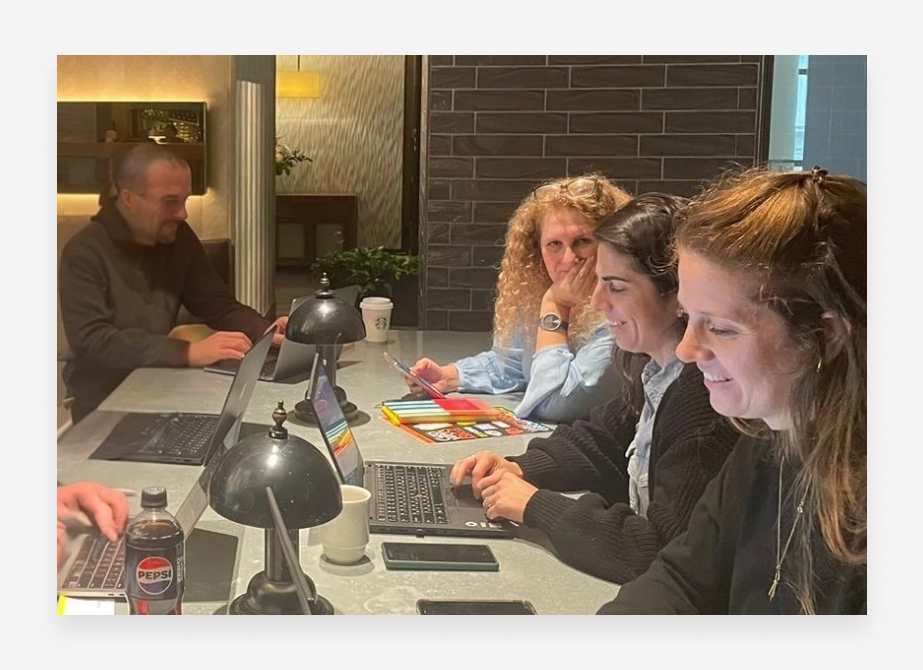- Ahi Ben-David

- Jul 8
- 4 min read

More than two-thirds of large-scale tech programs don’t meet expectations at launch, according to research from Boston Consulting Group.
B2B solutions are notoriously tricky, especially when the partner companies are established enterprises. Even more so in channel partnerships, when the end beneficiary is the partners’ customers. There’s a huge amount of trust and communication necessary to develop and launch successful solutions.
Wix’s B2B channel partnerships team prides itself on tailoring solutions to its esteemed partner companies like VistaPrint and Intuit Mailchimp. The custom integrations must allow a journey catered to the customer and business type, enabling them to understand how to start a business online with Wix. Aligning on needs—at both the company and customer level—is a crucial part of the solution design process.
We sat down with Ahi Ben-David, head of solution engineering for Wix’s global strategic partnerships, to talk about solutioning for effective partnerships and the essential role of a phase that’s often overlooked: pre-sale discovery.
Servicing SMBs? Show them how to build a website to grow their business online.
Wix Channels: Welcome, Ahi. Thanks for being here. Can you tell us a bit about your overall approach to solution engineering for Wix’s channel partnerships?
Ahi Ben-David: My pleasure. Our team’s approach focuses on bringing value by listening to the partner’s needs, collaborating on strategy and always thinking 360°.
People often forget that solution design spans the entire sales funnel. We’re present throughout the process, from pre- to post-sales, to support a successful outcome for both sides. We need to be aware of all the moving parts, zooming out and in again to bring all the pieces together.
WC: What would you say sets you apart from other SE teams?
ABD: Our solutions are “tailor made for you.” We work with global, well-known brands with high standards and specialized needs. So we take the time to listen pre-sale and apply our skills. Wix as a company is highly technical and product-focused, and so is our team. We’ve developed expertise in web integrations and solutions over the past nearly two decades, and we’re up for the challenge.
Discovery is our secret weapon. We put an emphasis on it to make sure we’re taking the best approach together before we get started.

Why discovery comes first
WC: What is pre-sale discovery and why is it important?
ABD: During the pre-sale process, we want to understand where the business partner is coming from, how they work and what they’re looking to achieve. For a successful partnership, I believe we need to have mutual knowledge that can help us get the best business results. The more we know, the better we can plan and execute smoothly.
The process includes data gathering and analysis, risk management and qualification for the partnership from a commercial, technical and business perspective. We learn about the partner’s business and their pain points—as well as the SMB customers and their pain points. In parallel, it’s important for us to educate the partner about Wix.
Ultimately, discovery is all about ensuring a partnership fit while building the relationship together.
WC: Can you share an example of how a thorough pre-sale discovery phase impacted the success of a partnership?
ABD: Yes, of course! During a discovery phase, we learned details about the partner company’s infrastructure that creates different customer journeys and user flows. This can affect conversion to the Wix website builder platform. Luckily, Wix is user-first, so we innovated to prioritize UX. We adjusted the solution, with different flows and utilizing different APIs.
If we didn't discover and address this issue early on, the launch could end up ineffective, delayed or costly for the partner company. Instead, we were prepared with the right solution.
WC: How has discovery influenced your partnerships and the long-term relationship?
ABD: We’ve seen a positive correlation between strong discovery stages and overall partnership health. The channel partners that invested in the discovery stage had smoother product integrations, streamlined optimization processes and a better overall relationship, leading to a successful partnership.
Discovery isn’t just best practice—it’s a partnership savior.

Overcoming challenges
WC: What are common challenges encountered during the discovery process?
ABD: “We don’t know,” “We’ll check and get back to you on this,” “Let’s make sure to sync on that next week”—these are the phrases we hear often during discovery. So common challenges include gaps in information and misaligned expectations. While this is usually very reasonable, we need to address concerns, not avoid them.
WC: How do you determine when the discovery phase is complete and it's time to begin designing the solution?
ABD: Good question. Don’t rush into the final solution design too early because discovery takes time and patience. On the other hand, don’t take forever! There are endless questions that can be asked, so it’s important to know when you’ve reached that delicate point to say, “Ok, we’ve got what we need at this stage. It’s time to solutionize.”
The truth is discovery never ends, even after implementation. So there will be plenty of time to keep analyzing and evaluating as you go.
WC: How do you ensure that the discovery process doesn’t delay the overall sales process?
ABD: I don’t see discovery as delaying the overall sales process. In fact, it can save a lot of time later on. And if the discovery shows there’s no match? Then it's best not to push forward with the sales process at all. We might find other areas to partner in.

A new era in discovery
WC: How important is it to engage with partners’ technical and business stakeholders during the discovery phase?
ABD: Strategic alignment is crucial. Each team has its role: The Sales team leads the process, Solution Engineering focuses on the integration and makes sure it’s achievable, and Product and Marketing come in with their insights to create a full picture. It’s a collaborative effort.
WC: How do you envision the process of discovery evolving in the future?
ABD: As we look towards the future, I believe we’ll improve our processes by using more AI tools for research and data analysis to make our discovery as seamless as possible—staying responsive to what our business partners need. We’re building experience and expertise with every discovery process we lead, resulting in healthy, impactful partnerships.
Learn more about how a tailor-made channel partnership can help you unlock growth for your business.



Comments